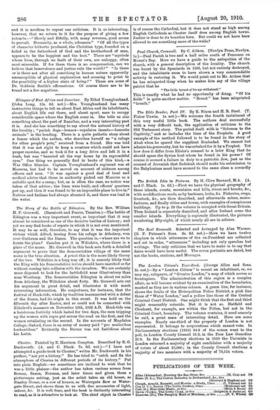The Story of the Battle of Edington. By the Rev.
William H. P. Greswell. (Barnicott and Pearce, Taunton.)—The battle of Edington was a very important event, so important that it may almost be considered as one of the decisive battles of history ; and yet we may find books of repute in which it is not even mentioned. It may be as well, therefore, to say that it was the important victory which Alfred, issuing from his refuge in Athelney, won over Guthrum and the Danes. The question is,—where are we to locate the place? Camden put it in Wiltshire, where there is a place of the name. Mr. Greswell in this book sets forth a detailed argument to prove that the Somersetshire village of the same name is the true situation. A priori this is the more likely theory of the two. Wiltshire is a long way off; it is scarcely likely that the King with his Somersetshire levies should have marched so far without ooming into collision with the invaders. We are certainly more disposed to look for the battlefield near Glastonbury than near Westbury. The Somersetshire Edington is about ten miles from Athelney, the Wiltshire about forty. Mr. Greswell sets out his argument in great detail, and illustrates it with much interesting information. He conjectures, for instance, that the festival of Hock-tide, which by tradition is.connected with a defeat of the Danes, had its origin in this event. It was held on the fifteenth day after Easter, and so could not be connected with Ethelred's massacre on November 13th, 1002 A.D. Hock-tido was a boisterous festivity which lasted for two days, the men tripping up the women with ropes put across the road on the first, and the women retaliating on the second. In the accounts of Magdalen College, Oxford, there is an entry of money paid " pro mulieribus hockantibus." Evidently the Bursar was not fastidious about his Latin.






































 Previous page
Previous page